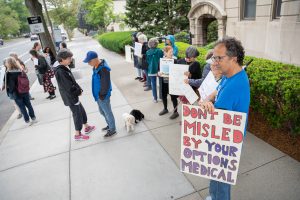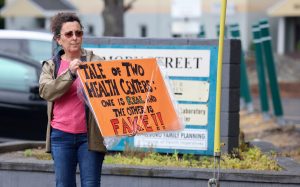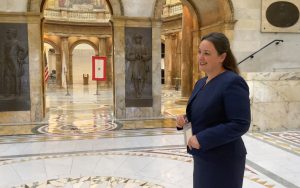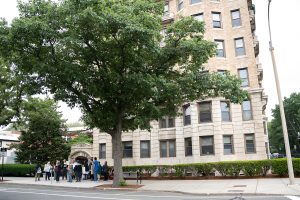- Slug: News21-After Roe-CPCs. 2,636 words.
- 5 photos available (captions and thumbnails below).
- 4 videos available (captions and credits available here).
- Abridged version available.
By Michaela Herbst, Jordan Gerard and Trilce Estrada Olver
News21
BROOKLINE, Mass. – The two women met on a cold and rainy June day outside a midrise medical building in this upscale Boston suburb, each on opposite sides of the most divisive issue in America today.
Laura Derman, 75, was picketing an open house at Your Options Medical, a so-called “crisis pregnancy center” inside the building. Even before the 1973 Roe v. Wade decision guaranteed the right to abortion, Derman fought for reproductive freedom and faced an unwanted pregnancy that she was able to terminate safely.
To her, Your Options is a misinformation machine posing as a medical clinic to scare women seeking abortions.
Anita Cunha, 51, is the Your Options patient advocate who walked outside to greet Derman and ask whether she and other protesters would like a tour. Cunha had two abortions before giving birth to a son, an experience that left her fighting to end abortion nationwide, including in Massachusetts, one of the most Democratic states in the union.
To her, Your Options is a place of healing – something she sought to convey to the demonstrators who toured the facility.
“They could ask their questions and we could have conversations with them without fighting or yelling or screaming,” Cunha said after the encounter. Of Derman she added: “She was very kind and her questions were good … and she seemed to be satisfied with my answers.”
Derman, however, said she didn’t learn anything she didn’t already know.
“I was glad that we … had an opportunity to talk to each other a little bit and maybe listen to each other and try to understand … the other person’s perspective,” she said. “But, clearly, they weren’t going to change our minds, and we weren’t going to change their minds.”
Regulating ‘crisis pregnancy centers’
In the year since the Supreme Court’s ruling in Dobbs v. Jackson eliminated federal abortion rights, so-called “crisis pregnancy centers” have become a focus in the renewed debate over abortion. The goal of such facilities is typically to dissuade women from having abortions, though supporters like Cunha say they provide necessary care and counseling.
The fury of both sides has come out in legislation and lawsuits. In states where abortion is banned, legislatures are pouring money and resources into these centers as alternatives to abortion. In states where abortion remains legal, lawmakers want to curb the influence of the facilities, which now vastly outnumber abortion clinics nationwide.
Before Roe shuttered clinics nationwide, there were about 800 abortion clinics in the U.S. in 2020, according to the Guttmacher Institute. Researchers put the number of “crisis pregnancy centers” at anywhere from 2,500 to 4,000.
This year, 29 states considered or passed bills to bolster these centers with taxpayer money, tax credits for donations or laws promoting so-called “medication abortion reversal,” a procedure that some claim can reverse the effect of an abortion pill, although medical experts say the treatment is not based on science.
At the same time, 12 states considered laws to prevent the centers from deceptive advertising or misusing medical data. Colorado, with probably the most robust anti-pregnancy center laws, was the first to outlaw “medication abortion reversal.”
“We just want to make sure that those centers don’t engage in any misleading or misinformation to a woman who is pregnant and also that they are following the standards of care,” said Democrat Julie McCluskie, speaker of the Colorado House of Representatives.
“Crisis pregnancy centers” say they offer counseling services, pregnancy tests, ultrasounds, parenting classes and other support for people who face unwanted pregnancies.
These centers “offer women the choice that our opposition has demanded for 50 years,” said Myrna Maloney Flynn, president of Massachusetts Citizens for Life, a nonprofit that advances policies to end abortion.
However, critics say the centers disguise themselves as abortion clinics or reproductive health centers. Your Options Medical in Brookline is two doors from an abortion clinic and shares a building with several OB-GYN offices.
These centers often tell women that abortion can cause depression, infertility and other health problems, including cancer – none of which has been proven medically. Although some are licensed, most are nonprofit organizations that don’t fall under medical regulations.
Attempted regulation of the centers is nothing new, but it grew more urgent in the past year as opponents felt their reach in states where abortion remains legal – places now seeing an influx of out-of-state patients.
“It’s a little bit like the frog in the pot, right?” said Laurie Veninger, an abortion-rights advocate with Indivisible Mass Coalition. “People knew it was coming but didn’t know that Dobbs would be coming so quickly, and now they’re playing catch up.”
Massachusetts emblematic of the national fight
Nowhere is the confrontation over these facilities more evident than in Massachusetts, where “crisis pregnancy centers” outnumber abortion clinics 2 to 1 in a state where abortion remains legal up to at least 24 weeks.
Last year, U.S. Sen. Elizabeth Warren, D-Mass., introduced a bill to nationally regulate information dispensed by the centers, but it went nowhere in a divided Congress. Then in March, Gov. Maura Healey approved a budget with $1 million for educational campaigns on the dangers of “crisis pregnancy centers.” The Massachusetts Legislature is also considering six bills to address deceptive practices, information privacy and “medication abortion reversal.”
State Rep. Lindsay Sabadosa, a Democrat, is the sponsor of one that would regulate the collection of consumer health data. Although the bill doesn’t mention “crisis pregnancy centers,” they are one of the targets. Critics fear the centers are collecting personal data from clients and tracking patients from out of state, and sharing that information with whomever they want.
In her Beacon Hill office, as the sun splashed on the golden dome of the Massachusetts Capitol and tourists wandered Boston Common, Sabadosa noted that these facilities are hard to regulate. In 2018, the U.S. Supreme Court ruled that requiring certain disclosures about their licenses and services violated the First Amendment.
Sabadosa is nevertheless trying to increase oversight, because she said she has seen firsthand how “crisis pregnancy centers” deceive women. As a volunteer for the Abortion Rights Fund of Western Massachusetts, she remembers receiving a call from a young woman who lived in an isolated part of the state and had no access to abortion care.
Terrified her parents would find out, the woman went to a “crisis pregnancy center” and received a free ultrasound. The staff said she had plenty of time to weigh her options because she was only three weeks pregnant. In fact, she was 11 weeks pregnant, Sabadosa said.
By the time the woman told her mother, she was beyond the state’s 24-week abortion limit and had to travel to another state, where she couldn’t use her health insurance.
“It was never clearer to me that there should not be anything that claims to be a health center that just straight up lies to you about how far along you are in a pregnancy and tells you that it’s all going to be OK,” Sabadosa said, “when actually, by virtue of that lie, it is probably not all going to be OK.”
Restrictions on the centers are being passed at the local level, as well. Somerville, across the Charles River from Boston, exudes New England charm with a mix of local restaurants – from mom-and-pop American to Himalayan – and a thriving business scene. Five languages are spoken there, according to councilor-at-large Kristen Strezo.
She’s the city leader who proposed an anti-abortion counseling center ordinance, which passed in March 2022. The ordinance allows for fines against centers that make deceptive statements about their services. Strezo, who acknowledges the city of 80,000 has no “crisis pregnancy centers,” said the measure is preemptive.
“The ordinance doesn’t shut down anything,” she said. “But it says that if any of these fake centers choose to try to establish in Somerville, (they must use) accurate information and that our residents are protected.”
Several other communities have followed suit.
Massachusetts is also at the center of a national legislative war over “medication abortion reversal.”
Many anti-abortion counseling centers offer the procedure to reverse an abortion after a patient takes the first of two pills to end a pregnancy. However, the American College of Obstetricians and Gynecologists says the practice is “not based on science and does not meet clinical standards.”
At a recent open house at the Abundant Hope Pregnancy Resource Center in Attleboro, the executive director showed off a photo gallery of six babies who supposedly survived the “reversal” process. The gallery is right outside the ultrasound room.
One Massachusetts bill would require the state health department to inform people about “medication abortion reversal” on its website. Physicians would also be required to tell pregnant individuals about this at least 24 hours before the chemical abortion takes place.
Kansas adopted such a law, and Colorado, Oregon and Tennessee had unsuccessful bills with almost identical wording.
Despite what experts say, Maloney Flynn, of Massachusetts Citizens for Life, insisted abortion pill reversal is safe.
“There’s thousands of babies around the world that exist because of APR,” she said.
Variations of “crisis pregnancy center” regulations appeared around the country this year. New York tried to require search engines like Google to warn consumers that abortion and other services may not be available at the centers. It failed. A Pennsylvania bill would prohibit false advertising from any pregnancy center receiving state money. And a bill that died in Kentucky tried to make it a misdemeanor to run an unlicensed center.
But the leader in regulation was Colorado. Gov. Jared Polis signed the “Safe Access to Protect Health Care” package on April 21, which included a new law that requires centers to provide medically accurate information and stop deceptive advertising. That law also prohibits administering “medication abortion reversal” in the state.
A long history
The first “crisis pregnancy center” was founded by Robert Pearson in 1967 in Hawaii, which in 1970 became one of the first states to legalize abortion.
Pearson offered financial support, counseling and prenatal care from his own home, and wrote a manual called “How to Start and Operate Your Own Pro-Life Outreach Crisis Pregnancy Center.” Subsequent centers used the manual as a business model, while others added new services, including crisis hotlines, pregnancy tests and assistance with social services.
According to a 2019 Columbia Law Review paper, Pearson told his phone operators not to answer questions about abortion services to persuade callers to come in.
“Crisis pregnancy centers” have almost always been established next to abortion clinics. Shortly after a Planned Parenthood clinic opened in Worcester, Massachusetts, in 1982, a “crisis pregnancy center” called Problem Pregnancy opened on the same floor. Three women went into the center believing it was the abortion clinic because a sign on the door said “PP,” which could be mistaken for Planned Parenthood. After filling out medical forms, they realized they were at the wrong place, according to the Columbia study.
In the early ’70s, these facilities grew further under organizations such as Heartbeat International, whose website says it created the first network of “crisis pregnancy centers” in the U.S. and now has more than 3,000 centers around the world. It provides training for new and existing centers.
Critics say Heartbeat and similar organizations have been gearing up for a national push since the reversal of Roe v. Wade. Gifts, grants, fundraising and other contributions to Heartbeat International nearly tripled – from $2.2 million to $6 million – in fiscal years 2016 to 2021, according to the most recent IRS filings for the organization.
Last year, The Associated Press studied the amount of state money given to “crisis pregnancy centers” and found a total of $89 million in a dozen states, compared to $17 million in eight states a decade earlier. This year, 14 states funneled money to “crisis pregnancy centers” through increased tax credits.
Even liberal Massachusetts needs more regulation of such centers – because they are expanding services and support in the wake of Roe’s reversal, said Jenifer McKenna, co-author of “Designed to Deceive: A Study of the Crisis Pregnancy Center Industry in Nine States.” She cited a local news story in which Massachusetts Citizens for Life said it planned to expand these services on a “wider, more comprehensive scale.”
Maloney Flynn said her group’s efforts are intended to counter the bombardment it has suffered since the overturn of Roe, from vandalism and threats to “verbal attacks” by the governor and legislators. It was her idea to unite the centers under a “Pregnancy Care Alliance” and to host the June 17 open house at Your Options Medical and seven other locations.
In addition to the Brookline location, Your Options Medical has a licensed clinic in Revere, Mass. The website lists abortion as an option but makes clear that the clinic itself does not provide abortions.
“It would be really wonderful to know that we’ve corrected some of those misperceptions and false allegations against us and recognize that there’s a place for the services that we have, that it’s OK for us to exist,” said Teresa Larkin, Your Options Medical executive director. “Along with abortion clinics, there doesn’t have to be one or the other, it can be both.”
Leaving it to the courts
The battle over anti-abortion counseling centers has also played out in the courts, dating at least to 1982, when Worcester Planned Parenthood won a lawsuit against the pregnancy center that put “PP” on its door.
A more recent case makes regulation difficult. In 2015, California passed a law requiring “crisis pregnancy centers” to inform residents about their services and licensure.
Two centers and the National Institute of Family and Life Advocates challenged the law in court, claiming it violated their First Amendment rights because the act required them to post a sign in their waiting rooms explaining that abortion services were available through other organizations.
In 2018, the U.S. Supreme Court ruled in favor of the plaintiffs.
Massachusetts is expecting lawsuits as soon as any of its legislation targeting the centers passes.
That’s what happened this year in Colorado, where the Becket Fund for Religious Liberty filed a lawsuit on behalf of Bella Health and Wellness, a Catholic health care clinic. The suit challenges the state’s prohibition on “medication abortion reversal,” which is not yet even in effect.
Rebekah Ricketts, a lawyer representing Bella Health, said the case was brought “because that law poses a serious violation of their First Amendment rights.”
‘They’re good actors’
If there’s anything new in this decades-old battle, besides all the legislation, it’s that open houses and access to “crisis pregnancy centers” may be working to help stem the criticism.
Even as they voted to regulate the centers, several Colorado legislators said the facilities provide good services.
State Sen. Janice Marchman, a Democrat, middle school teacher and mother of teens, signed on to the Colorado bills after listening to concerns about abortion access on the campaign trail. She also discovered that her hometown, Loveland, has one of the highest concentrations of “crisis pregnancy centers” in the state.
After a doctor from a Loveland pregnancy center spoke at a legislative hearing, Marchman decided to visit. What she found was a medical clinic with a licensed physician and a licensed nurse, whom she called “lovely.”
“It was fascinating to talk to them,” Marchman said. “They are providing services. Some women go in there for baby clothes, some go in for formula, some go in for an ultrasound, some go in for STI testing. They’re very clear on their website that no abortion services or emergency contraceptives are offered or referred to.
“They’re good actors,” she said. She just wants to make sure all of them are.
This report is part of “America After Roe,” an examination of the impact of the reversal of Roe v. Wade on health care, culture, policy and people, produced by Carnegie-Knight News21. For more stories, visit https://americaafterroe.news21.com/.




